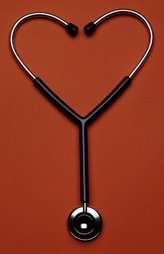"Where Doctors Go Wrong"
A thought-provoking article my former cardiology boss shared with some of us. It was in the March 15 issue of TIME magazine. We're all guilty of these "sins" at one time or another, aren't we?
Where Doctors Go Wrong
By Christine Gorman
The patient was an 8-year-old California girl with severe headaches. Her parents, who were both struggling to adjust to new high-pressure jobs, took her to top neurologists and pediatricians. The child's symptoms, the doctors concluded, were a response to stress at home, along with perhaps a sinus condition. But four or five months later, it became clear that she had a brain tumor and needed surgery. When her doctors looked back at early scans of her brain, they were aghast to see the shadow of a tumor they had previously overlooked.
For Harvard hematologist Jerome Groopman, who is a friend of the child's parents, the missed diagnosis was more than just a cautionary tale. It was the start of an investigative journey. "People talk about technical errors in medicine, but no one talks about thinking errors," he explains in an interview. "I realized I had no framework for understanding these kinds of problems."
For the next three years--in addition to seeing patients and doing research, plus his gig as a staff writer for the New Yorker--Groopman began to intensively examine how doctors think and how they get sidetracked from the truth. He learned that about 80% of medical mistakes are the result of predictable mental traps, or cognitive errors, that bedevil all human beings. Only 20% are due to technical mishaps--mixed-up test results or hard-to-decipher handwriting--that typically loom larger in patients' minds and on television shows.
The result of Groopman's journey is How Doctors Think (Houghton Mifflin; 307 pages), an engagingly written book that is must reading for every physician who cares for patients and every patient who wishes to get the best care. Groopman says patients can prompt broader, sharper and less prejudiced thinking by asking doctors open-ended questions and learning to identify some of their common thinking mistakes:
ERROR 1: I RECOGNIZE THE TYPE
Doctors, like most of us, are often led astray by stereotypes that are based on someone's appearance, emotional state or circumstances. Thus a homeless man's disorientation might be quickly attributed to alcoholism when the real culprit is diabetes.
Groopman describes this kind of "attribution error" in the case of a nervous young woman who kept losing weight even when prescribed a high-calorie diet. Her doctors, convinced that she was lying about her food intake, suspected anorexia or bulimia, but her problem, diagnosed after years of ill health, turned out to be celiac disease--an allergy to wheat. Had the patient been male or older or less anxious, the doctors might have got it right in the first place.
Groopman describes this kind of "attribution error" in the case of a nervous young woman who kept losing weight even when prescribed a high-calorie diet. Her doctors, convinced that she was lying about her food intake, suspected anorexia or bulimia, but her problem, diagnosed after years of ill health, turned out to be celiac disease--an allergy to wheat. Had the patient been male or older or less anxious, the doctors might have got it right in the first place.
ERROR 2: I JUST SAW A CASE LIKE THIS
"We all tend to be influenced by the last experience we had or something that made a deep impression on us," Groopman says. So if it's January, your doctor has just seen 14 patients with the flu and you show up with muscle aches and a fever, he or she is more likely to say you have the flu--which is fine unless it's really meningitis or a reaction to a tetanus shot that you forgot to mention.
The best defense--besides giving as complete a history as you can--is to be alert and ready to ask questions anytime a doctor says, "There's a lot of this going around."
ERROR 3: I'VE GOT TO DO SOMETHING
Physicians typically prefer to act even when in doubt about the nature of the problem. And yet this kind of "commission bias" can lead to all sorts of new problems if the treatment turns out to be incorrect.
"Don't just do something. Stand there," one of Groopman's mentors told him years ago when he was uncertain of a diagnosis. This buys a doctor time to think--which is especially important when trying to ensure that something hasn't been overlooked.
ERROR 4: I HATE (OR LOVE) THIS PATIENT
Groopman cautions that emotions are more of an issue than most physicians like to admit. Doctors who are particularly fond of a patient have been known to miss the diagnosis of a life-threatening cancer because they just didn't want it to be true. But negative emotions can be just as blinding, sometimes stopping a doctor from going the extra mile. "If you sense that your doctor is irritated with you, that he or she doesn't like you," says Groopman, "then it's time to get a new doctor." Studies show that most patients are pretty accurate in describing their doctors' feelings toward them.
Groopman's book makes abundantly clear that despite all the electronic databases that are being used to improve health care, a lot of medicine still comes down to a doctor or two puzzling out what might be wrong with your body. Experience, common assumptions and human nature can guide them or lead them astray. By asking a few questions--especially if you think your doctor isn't asking enough of them--you can raise the odds that your physician won't get detoured from the truth.



No comments:
Post a Comment